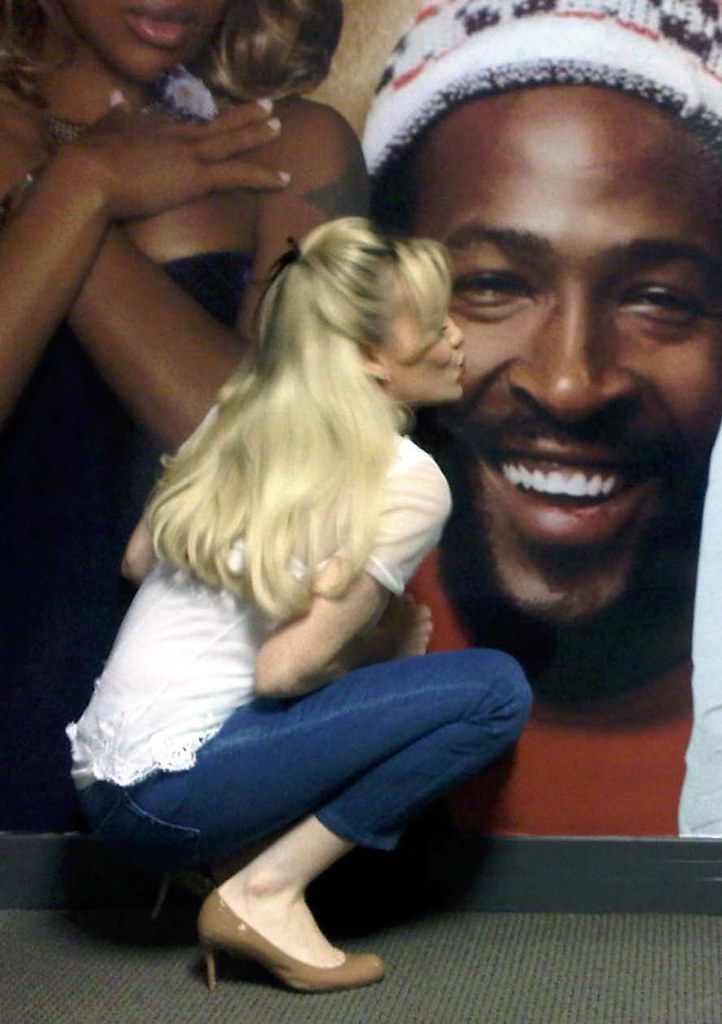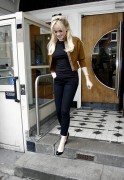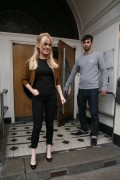Unofficial blog providing news about Welsh singer Duffy. Photos, reviews and interviews are charted here. If you have any pics/vids to share please leave a comment.
Monday, November 29, 2010
29 Nov: Herald Scotland Article
No need for mercy as Duffy follows Rockferry with album number two
Graeme Thomson, Herald Scotland
29 Nov 2010
The Welsh singer thinks she’s coping well with her sudden fame.
It’s Friday, so it must be Germany. Duffy is having “an extremely hard morning” reaching out to the European demographic, wading knee deep through all the promotional mulch that must be negotiated prior to the release of her new album, Endlessly. As she puts it, not entirely delicately, the singer has just spent the past few hours “being probed by German journalists wanting to know everything about my life”.
Probe they might, but I suspect she’s a woman who has learned not to give too much away. Fame does that to you. When I tell her later that Endlessly sounds like the work of someone who has been through the emotional mill, she laughs but veers away from a direct answer. “Through the emotional mill?” she ponders. “Isn’t that what women do anyway? Isn’t that how we spend most of our day?”
In fact, Duffy today is full of energy and excitement, buoyed by a burbling vivacity which seems genuine. Rarely far from a full-throated laugh, at times her voice drops to a soft, conspiratorial flutter; at others she merrily plucks her words out of thin air. In general – pesky German journos aside – she seems thrilled to be back in the fray.
Over the past three years Aimee Ann Duffy has metamorphosed from an unknown northwest Walian into a global superstar. Spool back to November 2007 and her name was just beginning to rise on the lips of critics heralding her as the Next Big Thing. With her second single Mercy and her debut album Rockferry, released in March 2008, she quickly sealed the deal.
A clever, contrived, ruthlessly commercial yet heartfelt patchwork of 1960s pop-soul shapes, Rockferry invited comparisons between Duffy and everyone from Lulu to Dusty Springfield. Its success wasn’t merely a local skirmish. Rockferry was a top five Grammy-winning album in the US and in Britain spent an entire year in the top 10. It has sold over eight million copies worldwide, and this in the dying days of the recording industry. I make that eight million reasons why Duffy’s life must have changed beyond all recognition.
“Not really,” she says. “Wouldn’t it be great to say yes? But not really. I think I’ve kept things in perspective. Of course, everything unravelled after the success. Everything always unravels, but that’s the way life is. My life always has these chapters that unravel.”
In the slipstream created by Rockferry’s impact, Duffy clearly experienced a few wobbles. She had difficulty adjusting to being recognised in the street, and caught considerable flak for advertising Diet Coke perched pertly on a push bike.
“If I’m being honest, I really didn’t think I’d be talking to you right now,” she says at one point. “It was possible you wouldn’t have heard from me for a few more years.” She talks about how she planned to “buy a house and disappear”, retreating to the sea, seeking anonymity in the wide open spaces. “I wanted to withdraw, I wanted to pull myself away from it all for a while,” she says. As it was, after coming off the Rockferry tour she did indeed buy a new house, but she only spent a week moving into it before taking off to make a new album.
Having worked on Rockferry with former Suede guitarist Bernard Butler as her producer and co-writer, on Endlessly she swapped the man who wrote Animal Nitrate for 66-year-old composer and producer Albert Hammond. As well as being the father of Albert Hammond Jr, the guitarist in The Strokes, Hammond is the man responsible for The Air That I Breathe, When I Need You, To All the Girls I’ve Loved Before and dozens more fromage-fragranced MOR staples.
It doesn’t seem, on the face of it, a terribly obvious creative partnership. Hammond’s wife had seen Duffy singing Stepping Stone on US comedy show Saturday Night Live and called her husband into the room. Although he had effectively been retired for the past few years, Hammond loved her voice and requested a meeting. Almost immediately, they began writing together.
Did she even know who Hammond was initially? “I remember my mum singing When I Need You doing the ironing,” she says. “But you don’t think, do you, about the person who wrote a song like that? It’s a shame, but it never crossed my mind to think beyond the song. It’s almost like it transcends humanity, like it’s always been there.”
The pair met up in January 2009, just before the Brit Awards, where Duffy picked up three trophies.
“Albert caught me at a point where I really wasn’t thinking about the next record,” she says. “I’d just hit that milestone, everyone was going, ‘Wow, five million record sales in less than a year’. Everything was kicking off and I wasn’t really thinking about more material, but he intuited that it was perfect timing. So it was like, ‘OK, let’s give this a whirl.’”
She had to wrestle with the traditional dilemma facing any singer who has experienced a colossally successful first record: follow that. Starting work on Endlessly, it must have been daunting to have the shadow of Rockferry hanging over her.
“Honestly, no,” she says. “It felt that the natural phase of the success of Rockferry had gone. There was new material, we had 25 songs written, and it was all part and parcel of moving on. It came together so seamlessly, there really didn’t feel like a moment of contemplation. Albert was so experienced, so wise, so fun, he made it all so easy. Sitting down and writing songs with him was a piece of cake.”
Endlessly gives Duffy a sleeker, more contemporary upgrade. Her voice, with its helium vibrato more pronounced than ever, will still divide listeners, but the songs are, if anything, even stronger than those on Rockferry. The rhythm hits harder and sharper on the upbeat tracks, which include some winning excursions into Abba-land. The ballads, meanwhile, are less orchestrated, more open and direct, with real emotional clout behind them.
Duffy may have been stepping out with Welsh rugby player Mike Phillips for the past year, but the album speaks eloquently of vividly recalled turmoil. You can hear the unmistakable twinge of raw nerve endings and severed heart strings.
“I was searching for this purity, this vulnerability, this naivety,” she says. “Both Albert and I in our own little way, 40 years apart, were fighting for that. The problem is I’m a perfectionist. I’m a control freak with my music. I long for quality. I yearn for it, I search for it, it has a hold on me, but I can over-think things. I wanted this to be real and raw.”
Now 26, Duffy has certainly developed as a writer, a fact she attributes to the support she has had from collaborators like Hammond and Butler. “I appreciate the room I’m given to say so much,” she says. “It would be easy to snatch the pen off me and say, ‘No kid, let us do the writing for you’, but people I’ve worked with have been interested to see what I bring. It wasn’t so easy years ago, I didn’t get any room. I remember being 16 and meeting writers and feeling quite censored. I’ve had to wait with diligence.”
Another reason Endlessly sounds so fresh is that it features The Roots, Philadelphia’s legendary jazz-influenced hip-hop band whose snap and crackle keeps the record rattling along. Their presence was another case of divine intervention via cathode ray tube. Hammond saw the band playing on television – “I think his entire career is down to sitting in front of the telly,” giggles Duffy – and suggested that they use them as the backing group. Unbeknownst to Hammond, Duffy was already a huge Roots fan, and had given drummer Questlove a copy of Rockferry in 2008.
She clearly gets a kick out of these serendipitous touches. Perhaps Duffy has discovered over the past three extraordinary years that it’s healthier to attribute fame and fortune to the vagaries of chance. “There’s an expression ‘spitting in the wind’,” she says. “I feel that’s how I live my life: spitting in the wind, living on the edge, putting it all to fate and seeing what happens.” She laughs happily. “It’s quite extreme.”
Music OMH Interview
| by Ben Hogwood, MusicOMH | ||||
| ||||
Sunday, November 28, 2010
27 Nov: Duffy sings Well Well Well on TV Total (German TV)




Thanks to Succo for recording it... unfortunately the youtube video was removed. But you can still watch it by clicking here.
Do not adjust your sets. And don't think that Duffy was lip-syncing. It sounds like the reverb effect went terribly OTT. I bet someone's head rolled for that mistake.
UPDATE: There is apparently a video with no reverb problem. If you have it please leave a comment!
Thanks.
Thursday, November 25, 2010
25 Nov: Watch Duffy on BBC Breakfast
Tuesday, November 23, 2010
22 Nov: Duffy Myspace Message
Win A Meet & Greet With Duffy In Germany
Duffy will be heading to Germany later this month to perform on hit TV show Popstars in Germany and you could win the chance to meet her and watch the performance.
Simply head to myspace.com/vertigofm and enter their competition which also includes money for your travel costs.
Duffy will be performing on Popstars on November 30, make sure you tune in.
Monday, November 22, 2010
DUFFY ON TV
Duffy On TV
There's a veritable feast of Duffy TV appearances on the way. Here's where you tune in:
On Tuesday, Nov 23;
Duffy will be playing Well, Well, Well and chatting live on The One Showfrom 7pm on BBC1.
On Thursday, Nov 25;
Duffy will be talking to BBC Breakfast between 8:45am and 9:15am on BBC1.
On Monday, Nov 29;
This Morning will be interviewing Duffy before she delivers another performance of Well, Well, Well. All on ITV1 between 11.30am and12.30pm.
On Thursday, Dec 2;
Duffy will be chatting to the legendary Alan Titchmarsh and playing live onITV1 between 5:00pm and 6:00pm.
22 Nov: Duffy Live @Maide Vale - Ken Bruce show
Bonus Track Available from HMV Digital
22 Nov: Myspace message -Duffy will be pinging soon....
Duffy Shares Her Favourite Tunes On Ping
Over the next few weeks Duffy will be sharing a selection of her favourite tunes via her iTunes Ping feed.
So, for the inside track on the music that inspired Duffy, click here and follow her iTunes Ping now.
22 Nov: News Articles in Wales

A GRAMMY, three Brits, 6.5 million sales and numerous worldwide Number Ones including Mercy, a daffodil named after her – it would be reasonable to think Duffy might return with Rockferry Part Two.
The girl from Nefyn is back but she’s done nothing of the sort. Which is something in itself. She was unsure if she even wanted to make a second album.
“I thought about walking away, I really did,” she says. “Not because I thought ‘I’d done it’. It’s just that I missed the simple things in life. Life had got so complicated.”
Her new album marks a departure from her 60s soul indebted debut. Although not a thousand miles from Rockferry, Endlessly is a step towards the dancefloor.
A little more sugar coated, a little more produced.
It is not surprising, on board for this effort was legendary songwriter and producer Albert Hammond. He’s working with Duffy after a decade-long absence from the music industry.
Hammond was unknown to Duffy when he first approached her. Her musical career took off in similar fashion – she didn’t know Suede when she met Bernard Butler in 2004.
The new collection, which was recorded in three weeks, took her to New York, London and Spain.
It also includes contribution from The Roots.
The 26-year-old has evidently thought long and hard about who best to collaborate with on her sophomore effort. The result is a radio friendly, well-produced pop record.
Really, you would not expect anything less.
Duffy releases her second album
Nov 21 2010 David Owens, Wales On Sunday

She’s the multi million-selling soul diva who went from an unknown to one of the world’s biggest singing stars. Here Duffy tells Dave Owens all about fame, fortune and her love for a Wales rugby international
THE last time Wales On Sunday spoke to Duffy, she was standing barefoot outside her London flat smoking a crafty cigarette – and asking us not to tell her mum about it – while going completely unnoticed by passers by.
Now, almost exactly three years to the day and six and a half million sales of her debut album Rockferry later, nipping outside for a crafty anything would most likely result in a swarm of screaming fans and the strobing flashes of the waiting paparazzi cameras.
But despite being caught up in a dizzying whirlwind of success that’s seen her bag BRIT Awards and Grammys alike, score a No 1 single and album simultaneously and play to sell-out crowds worldwide – not to mention have a Daffodil named after her – the 26-year- old from North Wales said she always knew she’d make it.
Why? Because her family told her so.
“They always knew that this was going to happen,” smiled the girl from Nefyn, who went onto become one of the biggest female singers in the world.
My mum and my sisters knew I was going to succeed or die trying, because I’ve always been like that.
“I remember being 16 years old and I was sat on the bed with my two sisters, around the time when I was at college,” added Duffy, who, despite the exhaustive schedule of a mega-selling artist with a new record coming out, still finds the time to ring home up to six times a day.,
“ I was singing in bands, waitressing in a café and my sisters Kelly and Katy were asking me why I was doing all of this.
“But I just used to push myself to do it. I didn’t even know why I wanted to belong in music and, to this day, I still don’t.
“My determination was something that simply couldn’t be measured, that’s all.”
However, that’s not to say that, in the harshest light of the spotlight’s glare, there weren’t the occasional moments of doubt.
“I thought about walking away, I really did,” she confessed of the moment her fame went stratospheric.
“Not because I thought I’d done it. It’s just that I missed the simple things in my life, a life that had got so complicated.
“I found myself longing to be on an empty beach in North Wales, walking with only myself and my thoughts for miles around – but that being said, I never have any regrets.
“I don’t really yearn, don’t look back; I’m constantly looking forward, so I don’t give myself the opportunity to lick my wounds and pine to be somewhere else.
“I decided that this is the place I’ve chosen to be and to accept it whole-heartedly.”
Even, she added, if that does mean having to scrutinise everything you do or say for fear of it coming back to haunt you in the most public way possible.
“I am very much one of those sort of wild, young girls, I like to enjoy myself,” revealed Duffy.
“When I get drunk, I either laugh or cry.
“So I think of how many moments in the last few years where I could have been seen with mascara on my face, pouring my heart out to friends over numerous bottles of wine and how lucky I’ve been to have done it in private.
“I don’t want to look back when I’m 60 and see pictures on the internet of me coming out of a nightclub really drunk and half naked,” she shuddered.
That hasn’t prevented her being snapped with her Wales and Lions rugby ace beau Mike Phillips, doing their grocery shopping around Penarth though – not that she actually minds the world knowing that she’s currently spoken for.
“Mike is 6ft 3in and more than 16 stone. I need some solid arms around me when I feel vulnerable,” Duffy grinned.
“He’s a huge influence on me, I’m blushing just at the mention of his name.
“Last week was the first time I’ve actually admitted I’m in love,” she chirped.
“An American radio DJ asked me out, said, ‘I’m falling for you, are you single?’ And for the first time ever, I went, ‘No, I’m not’.
“It was an out-loud acknowledgement that I am officially off the market and we just try to ignore the whole fame thing and enjoy being with each other.
“We don’t do showbiz parties. What would we do there anyway? We would only end up sitting in a corner together chatting,” she added.
“Obviously, I’ve had to get into the rugby.
“I don’t think I’ve missed an international match for a while now.”
However, she refused to be drawn on whether she was going to give Wills and Kate Middleton a right royal run for their money with news of her own impending nuptials.
“I don’t want to be looking too far ahead as I’m a girl who lives for now.
“But I am very old-fashioned and I wouldn’t want to presume,” she laughed.
“Besides, I think the guy has to be the one to propose.”
And what of the other man in her life, the one 40-years her senior with whom she’s become inseparable?
We’re talking, of course, about Albert Hammond, celebrated hit songwriter and father of Strokes guitarist Albert Hammond Jnr, who helped her pen her new album, Endlessly.
“He was in his house in LA one day and his wife went, ‘Albert! Look at this girl on TV, she sounds like a black woman!’” recalls Duffy.
“And when he looked he went, ‘Oh my God’.”
The show was Saturday Night Live, the song was Stepping Stone, and the moment marked the 66-year-old legendary music icon’s return to the industry after a decade away.
“He asked to meet me and I had no idea about his background,” explained Duffy of the London-born hitmaker.
“He told me he had this song called Don’t Forsake Me and I said, ‘That sounds like the soundtrack of my life!’”
The pair sparked off each other and wrote new tunes until well into the dead of night.
“It was four in the morning and I remember looking at him dancing around and thinking, ‘You’re 40 years older than me. I do not know where you get your energy from’.
“I had to be like, ‘OK, focus. Albert, I know you’re dancing, but what we need to do now is record the second verse’!” she said.
Duffy’s new album Endlessly is released on Monday, November 29.

A GRAMMY, three Brits, 6.5 million sales and numerous worldwide Number Ones including Mercy, a daffodil named after her – it would be reasonable to think Duffy might return with Rockferry Part Two.
The girl from Nefyn is back but she’s done nothing of the sort. Which is something in itself. She was unsure if she even wanted to make a second album.
“I thought about walking away, I really did,” she says. “Not because I thought ‘I’d done it’. It’s just that I missed the simple things in life. Life had got so complicated.”
Her new album marks a departure from her 60s soul indebted debut. Although not a thousand miles from Rockferry, Endlessly is a step towards the dancefloor.
A little more sugar coated, a little more produced.
It is not surprising, on board for this effort was legendary songwriter and producer Albert Hammond. He’s working with Duffy after a decade-long absence from the music industry.
Hammond was unknown to Duffy when he first approached her. Her musical career took off in similar fashion – she didn’t know Suede when she met Bernard Butler in 2004.
The new collection, which was recorded in three weeks, took her to New York, London and Spain.
It also includes contribution from The Roots.
The 26-year-old has evidently thought long and hard about who best to collaborate with on her sophomore effort. The result is a radio friendly, well-produced pop record.
Really, you would not expect anything less.
Duffy releases her second album
Nov 21 2010 David Owens, Wales On Sunday

She’s the multi million-selling soul diva who went from an unknown to one of the world’s biggest singing stars. Here Duffy tells Dave Owens all about fame, fortune and her love for a Wales rugby international
THE last time Wales On Sunday spoke to Duffy, she was standing barefoot outside her London flat smoking a crafty cigarette – and asking us not to tell her mum about it – while going completely unnoticed by passers by.
Now, almost exactly three years to the day and six and a half million sales of her debut album Rockferry later, nipping outside for a crafty anything would most likely result in a swarm of screaming fans and the strobing flashes of the waiting paparazzi cameras.
But despite being caught up in a dizzying whirlwind of success that’s seen her bag BRIT Awards and Grammys alike, score a No 1 single and album simultaneously and play to sell-out crowds worldwide – not to mention have a Daffodil named after her – the 26-year- old from North Wales said she always knew she’d make it.
Why? Because her family told her so.
“They always knew that this was going to happen,” smiled the girl from Nefyn, who went onto become one of the biggest female singers in the world.
My mum and my sisters knew I was going to succeed or die trying, because I’ve always been like that.
“I remember being 16 years old and I was sat on the bed with my two sisters, around the time when I was at college,” added Duffy, who, despite the exhaustive schedule of a mega-selling artist with a new record coming out, still finds the time to ring home up to six times a day.,
“ I was singing in bands, waitressing in a café and my sisters Kelly and Katy were asking me why I was doing all of this.
“But I just used to push myself to do it. I didn’t even know why I wanted to belong in music and, to this day, I still don’t.
“My determination was something that simply couldn’t be measured, that’s all.”
However, that’s not to say that, in the harshest light of the spotlight’s glare, there weren’t the occasional moments of doubt.
“I thought about walking away, I really did,” she confessed of the moment her fame went stratospheric.
“Not because I thought I’d done it. It’s just that I missed the simple things in my life, a life that had got so complicated.
“I found myself longing to be on an empty beach in North Wales, walking with only myself and my thoughts for miles around – but that being said, I never have any regrets.
“I don’t really yearn, don’t look back; I’m constantly looking forward, so I don’t give myself the opportunity to lick my wounds and pine to be somewhere else.
“I decided that this is the place I’ve chosen to be and to accept it whole-heartedly.”
Even, she added, if that does mean having to scrutinise everything you do or say for fear of it coming back to haunt you in the most public way possible.
“I am very much one of those sort of wild, young girls, I like to enjoy myself,” revealed Duffy.
“When I get drunk, I either laugh or cry.
“So I think of how many moments in the last few years where I could have been seen with mascara on my face, pouring my heart out to friends over numerous bottles of wine and how lucky I’ve been to have done it in private.
“I don’t want to look back when I’m 60 and see pictures on the internet of me coming out of a nightclub really drunk and half naked,” she shuddered.
That hasn’t prevented her being snapped with her Wales and Lions rugby ace beau Mike Phillips, doing their grocery shopping around Penarth though – not that she actually minds the world knowing that she’s currently spoken for.
“Mike is 6ft 3in and more than 16 stone. I need some solid arms around me when I feel vulnerable,” Duffy grinned.
“He’s a huge influence on me, I’m blushing just at the mention of his name.
“Last week was the first time I’ve actually admitted I’m in love,” she chirped.
“An American radio DJ asked me out, said, ‘I’m falling for you, are you single?’ And for the first time ever, I went, ‘No, I’m not’.
“It was an out-loud acknowledgement that I am officially off the market and we just try to ignore the whole fame thing and enjoy being with each other.
“We don’t do showbiz parties. What would we do there anyway? We would only end up sitting in a corner together chatting,” she added.
“Obviously, I’ve had to get into the rugby.
“I don’t think I’ve missed an international match for a while now.”
However, she refused to be drawn on whether she was going to give Wills and Kate Middleton a right royal run for their money with news of her own impending nuptials.
“I don’t want to be looking too far ahead as I’m a girl who lives for now.
“But I am very old-fashioned and I wouldn’t want to presume,” she laughed.
“Besides, I think the guy has to be the one to propose.”
And what of the other man in her life, the one 40-years her senior with whom she’s become inseparable?
We’re talking, of course, about Albert Hammond, celebrated hit songwriter and father of Strokes guitarist Albert Hammond Jnr, who helped her pen her new album, Endlessly.
“He was in his house in LA one day and his wife went, ‘Albert! Look at this girl on TV, she sounds like a black woman!’” recalls Duffy.
“And when he looked he went, ‘Oh my God’.”
The show was Saturday Night Live, the song was Stepping Stone, and the moment marked the 66-year-old legendary music icon’s return to the industry after a decade away.
“He asked to meet me and I had no idea about his background,” explained Duffy of the London-born hitmaker.
“He told me he had this song called Don’t Forsake Me and I said, ‘That sounds like the soundtrack of my life!’”
The pair sparked off each other and wrote new tunes until well into the dead of night.
“It was four in the morning and I remember looking at him dancing around and thinking, ‘You’re 40 years older than me. I do not know where you get your energy from’.
“I had to be like, ‘OK, focus. Albert, I know you’re dancing, but what we need to do now is record the second verse’!” she said.
Duffy’s new album Endlessly is released on Monday, November 29.
























